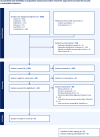Acceptability and feasibility of pre-exposure prophylaxis for bacterial STIs: a systematic review
- PMID: 39913625
- PMCID: PMC11801728
- DOI: 10.1371/journal.pone.0317669
Acceptability and feasibility of pre-exposure prophylaxis for bacterial STIs: a systematic review
Abstract
Background: A recent resurgence of bacterial sexually transmitted infections (STIs) is placing a major burden on high-risk populations, physicians, and the healthcare system. Treatment in the form of antibiotic pre-exposure prophylaxis (STI PrEP) is a potential solution. However, little is known about the acceptability and feasibility of this approach in high-risk populations.
Methods: A comprehensive search strategy was developed and executed in October 2024 across six databases adhering to PRISMA guidelines.
Results: Eight studies met the inclusion criteria. These studies were all conducted in high-income countries, used various methods, and all focussed on sexual minority men. Findings consistently identified moderate to high levels of acceptability among GBMSM (54.3% - 67.5%). Factors such as engagement in perceived 'high risk' sexual encounters, and past diagnosis of STIs strengthened acceptability, while others (e.g., antimicrobial resistance concerns and stigma) act as barriers. Only one study included the perspectives of healthcare workers, indicating a moderate willingness to prescribe, which would increase under governing-body endorsement.
Discussion: Overall, while there is some promise of STI PrEP acceptability among GBMSM, vast gaps in knowledge remain. Knowledge transfer and feasibility and, hence, the sustainability and capacity needed for the success of STI PrEP is yet to be examined and understood. However, for STI PrEP to be successfully adopted, it is essential not only to assess its acceptability and feasibility but also to focus on knowledge transfer. Knowledge transfer is a dynamic and iterative process, involving the synthesis, dissemination, exchange, and application of knowledge in an ethically sound manner. This process supports the improvement of health outcomes, strengthens healthcare systems, and ensures that healthcare interventions, such as STI PrEP, are effectively understood and implemented by both healthcare providers and at-risk populations. Similarly, the perspectives of populations beyond GBMSM have been omitted, and there is little understanding of the impact of their differing socio-cultural contexts around sex-related behaviour and Western pharmaceutical healthcare interventions on their acceptance and uptake.
Conclusion: Further research into acceptability, feasibility and knowledge transfer among diverse high-risk groups, healthcare professionals, and policymakers is necessary to create a strong foundation for implementing STI PrEP.
Copyright: © 2025 Carroll et al. This is an open access article distributed under the terms of the Creative Commons Attribution License, which permits unrestricted use, distribution, and reproduction in any medium, provided the original author and source are credited.
Conflict of interest statement
The authors have declared that no competing interests exist.
References
-
- Department of Health. Fourth national sexually transmissible infections strategy. Canberra: Commonwealth of Australia; 2018.
-
- The Kirby Institute. Sexually transmissible infections surveillance data. Sydney: University of New South Wales; 2023.
-
- Holt M, Newman CE, Lancaster K, Smith AK, Hughes S, Truong H-HM. HIV pre-exposure prophylaxis and the “problems” of reduced condom use and sexually transmitted infections in Australia: a critical analysis from an evidence-making intervention perspective. Sociol Health Illn. 2019;41(8):1535–48. doi: 10.1111/1467-9566.12967 - DOI - PubMed
Publication types
MeSH terms
Substances
LinkOut - more resources
Full Text Sources
Medical
Miscellaneous


